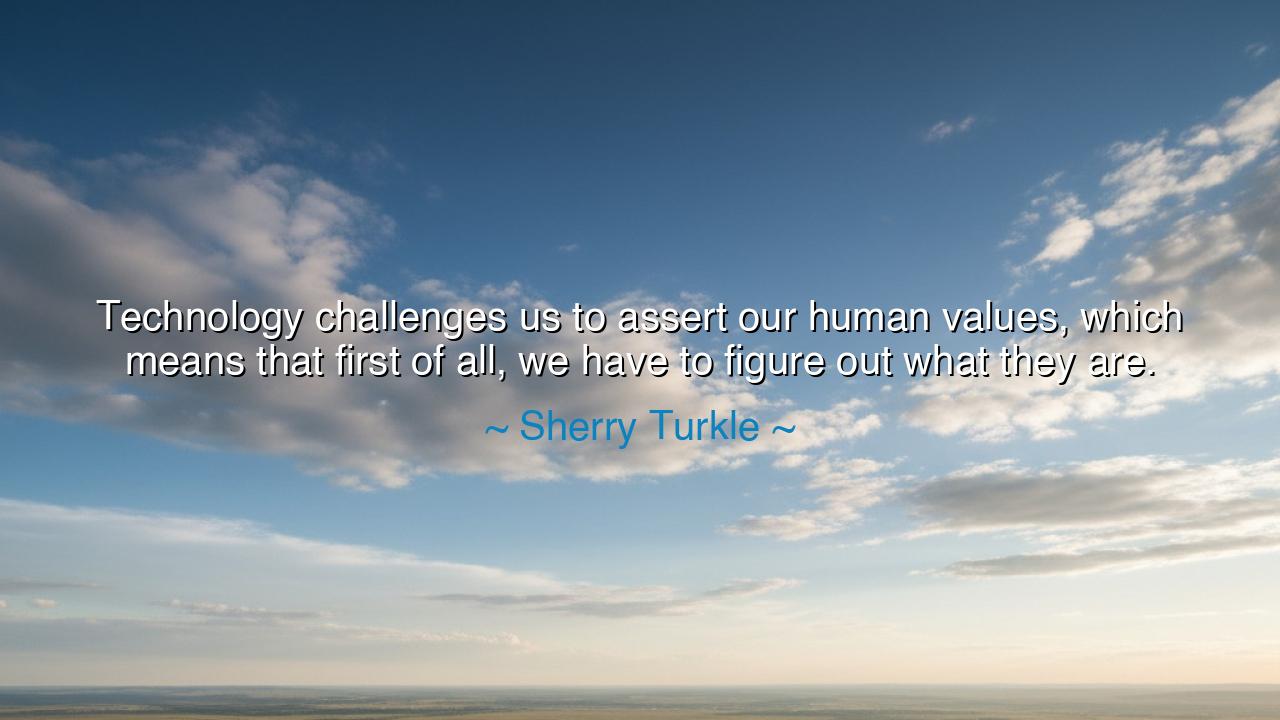
Technology challenges us to assert our human values, which means
Technology challenges us to assert our human values, which means that first of all, we have to figure out what they are.






Sherry Turkle, the philosopher of machines and minds, once declared: “Technology challenges us to assert our human values, which means that first of all, we have to figure out what they are.” These words pierce like an arrow, for they reveal both the gift and the trial of our age. Technology, dazzling and powerful, does not merely shape the world outside of us—it presses inward, asking us to decide who we truly are. Before we command machines, we must first command ourselves. Before we set the compass of invention, we must know the compass of the heart.
When Turkle speaks of “human values,” she calls us back to the ancient questions: What do we honor? What do we protect? What do we hold sacred? Is it truth? Is it compassion? Is it justice, beauty, or freedom? For technology will magnify what we choose—whether virtue or vice. A network can spread wisdom or lies; an engine can heal the sick or forge weapons; an algorithm can uphold justice or entrench bias. The tools themselves are neutral, but in our hands they become mirrors of our values. Thus, Turkle warns us that the challenge is not only technical, but moral.
History shows this truth vividly. When the printing press was invented by Gutenberg, it unleashed a flood of knowledge. Sacred texts, once chained in monasteries, were spread to common men and women. This technology became a force of liberation—but also of conflict, for it spread both truth and propaganda, reform and war. Humanity was forced to ask: What shall we do with this power? What do we value more—control or freedom, order or knowledge? Technology was not the answer; it was the question that demanded one.
So too with the atomic bomb. When it was first unleashed, the brilliance of science had opened a door that could not be closed. The world stood trembling. Nations realized they possessed the power to annihilate themselves. And thus, they were compelled to ask: Do we value conquest, or survival? Do we value power, or peace? Out of this reckoning came treaties, safeguards, and fragile commitments. Again, the invention did not dictate morality—it demanded humanity confront morality. Turkle’s words remind us that this pattern will repeat with every new tool we create.
In our own age of digital networks and artificial intelligence, we stand at a similar crossroad. Our devices shape our relationships, our speech, even our solitude. Social media connects billions, yet also breeds envy, anger, and loneliness. Algorithms guide our choices, yet often in ways unseen. We are challenged daily to ask: What do we value? Connection or spectacle? Knowledge or distraction? Truth or convenience? It is here that Turkle’s wisdom rings loudest—before we can assert our human values, we must first define them, or risk being swept away by the current of invention.
The lesson is profound: do not let technology choose your values for you. Choose them first, and let technology serve them. Define what matters most—kindness, justice, integrity, love—and then measure every tool by whether it strengthens or weakens those foundations. Without this discipline, we risk becoming servants of the very machines we created. With it, we remain their masters, guiding them to uplift rather than diminish humanity.
Therefore, I counsel you: in your life, pause to name your values. Ask yourself: What do I stand for? What must never be sacrificed, no matter the promise of progress? Then, when new technologies appear—whether in your hand, your home, or your nation—test them against this list. Use what honors your values; reject what erodes them. In this way, you become not only a consumer of technology, but a guardian of the human spirit.
So let Sherry Turkle’s words echo across the generations: “Technology challenges us to assert our human values.” Accept this challenge. For technology will always advance, but whether it serves the light or the shadow depends not on its circuits, but on our hearts. First, know who you are. Then, and only then, can you decide what to do with the power you hold.






AAdministratorAdministrator
Welcome, honored guests. Please leave a comment, we will respond soon